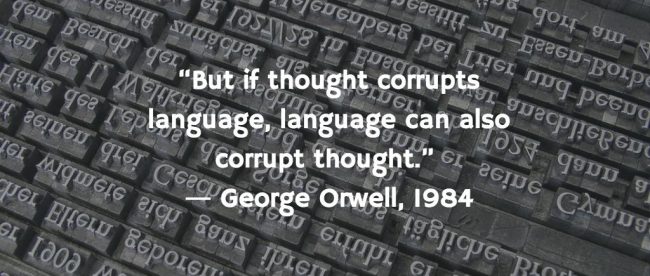Language

We’ve basically been dragged through the linguistic mud as if low language didn’t make us low, too.
I was intrigued to hear the Republican candidate’s campaign manager attribute her employer’s vulgarity to the “coarsening of our culture.” This is nonsense. We’ve seen the sitting President in the most stressful situations use speech masterfully; whether you agree with him or not, you can see that he strives to use words with great care.
I expect a good leader to rise above the coarseness of our culture. I expect him or her to lead in terms of exceptional use of words. Some of our Presidents have excelled at this. On the other hand, I get that a person with experience in reality TV, where a common form of entertainment is insulting others, might not spend a lot of time elevating his language game.
Those of us who work with words know their power. We know that words are generative. We know that conversation frames our reality. The words we use make our world. In her recent essay in the Guardian, novelist, essayist, and poet Barbara Kingsolver writes of our post-election responsibilities: “If we’re artists, writers, critics, publishers, directors or producers of film or television, we reckon honestly with our role in shaping the American psyche . . . If we’re teachers we explicitly help children of all kinds feel safe in our classrooms under a bullying season that’s already opened in my town and probably yours. Language used by a president may enter this conversation. We say wrong is wrong.”
Recently I re-watched a video created by actor John Tufts of the Oregon Shakespeare Festival for the It Gets Better project. The film helps shed light on the rite-of-passage bullying that many experience at the hands of their peers in the schools. It Gets Better begs to differ with the breezy, sticks-and-stones adage that words can never hurt us. Instead, It Gets Better recognizes that the deep effects of our language go straight to the heart and soul of individuals.
I trust the instincts of the project, and I trust the sensitivity of those who understand the power of words. Words create. Words affect. The words we use when we talk to ourselves and others are the glue of our communal life.
Words enliven: they reverberate and vibrate and set into motion the actions and reactions we see before our eyes.
Knowing that language has such power, I reject the notion that the leader of the free world is a victim of a coarse culture. So should the President-elect understand that he holds the responsibility of using his words for good. I fully expect him not to; we’ve seen him take the conversation low no matter who he’s speaking with. Therefore we who understand the power of words must hold the feet of those in power to the fire. “Speak truth to power.” — American Friends Service Committee
Read the Kingsolver. Do as she advises. I promise you that I will, too.

Leave a comment